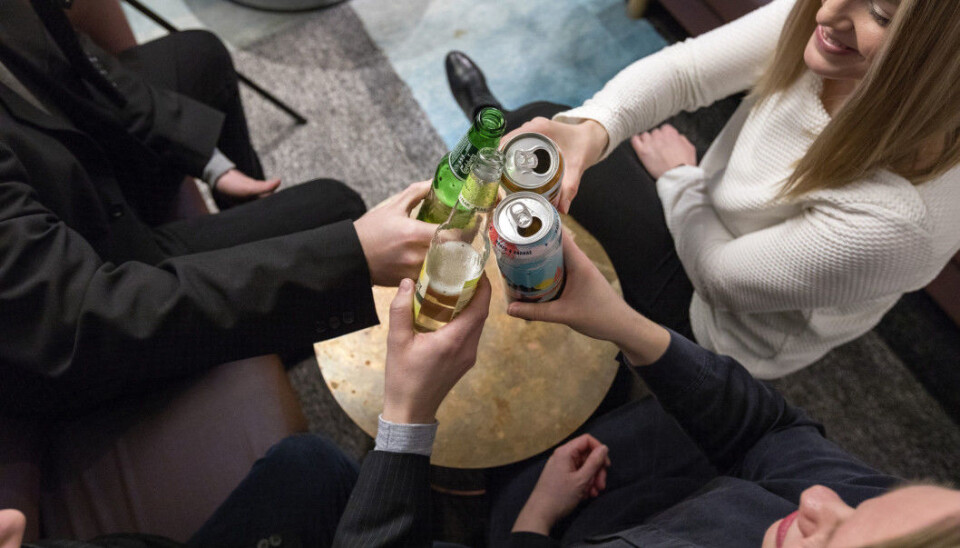
Young people with past behavioural problems get high more
Significantly more teenagers use alcohol and drugs if they’ve had behavioural problems as children, reports a recent study.
It isn’t uncommon for adolescents to try out alcohol and drugs. However, researchers wanted to find out if children with behavioural problems were at greater risk of testing drugs as teenagers than others.
For 10 years, the researchers followed 2440 children in the Bergen area from when they were 7 to 9 years old until they were between 16 and 19 years old.
The participating children, parents and teachers filled out questionnaires four different times during the study.
Problematic behaviour
The parents answered questions about whether the child exhibited problematic behaviours such as being disruptive, making trouble, being in conflict with teachers, friends or having generally violent behaviour.
The youth reported on their own alcohol and drug use.
“We found a clear connection where children who’d had the greatest behavioural problems more often reported using alcohol and drugs when they were older,” says researcher Ove Heradstveit at the Regional Centre for Child and Youth Mental Health and Child Welfare in Bergen.
But he adds that the data on level of use is not as dramatic as it may sound.
The proportion of 15-year-olds who drink alcohol at least once a month has dropped by half in the last 20 years, according to a Norwegian Institute of Public Health report from two years ago.
“Among youth in general, about 11 per cent had tried drugs, the Bergen study stated. Among adolescents who’d had behaviour problems as children, 17 per cent had tried drugs,” Heradstveit said.
Lonely children were "protected"
The researchers also looked at children who had trouble making friends, were anxious or had emotional problems such as anxiety symptoms or depression.
“Here we found an inverse relationship. That is, this group of children had a little lower risk of using alcohol and drugs in adolescence than others,” Heradstveit said.
As he interprets it, these young people tend to withdraw more socially, and they may therefore be less susceptible to ending up in situations with a high risk of using alcohol or drugs.
The trend in recent years indicates that young people around the world are drinking less now than previously.
Risk factor for substance abuse and mental health problems
Using alcohol and drugs in adolescence can be a strong risk factor for both mental health issues and long-term alcohol and drug-related problems.
“It’s important to be aware that some young people are extra vulnerable when tackling substance abuse prevention measures,” says Heradstveit.
He emphasizes that several factors affect the use of alcohol and drugs in the long term, such as parental boundary setting, friend relationships, genetic predisposition to addiction, unfavourable family relationships, and whether parents have problems with alcohol.
"If the child has ADHD symptoms or has had other behavioural problems, it’s all the more important to set clear parental limits for the teenager," says Heradstveit.
Same pattern in Denmark and Greenland
The researchers have also contributed Norwegian data to a Nordic study on adolescents and drugs.
They wanted to investigate whether there was a connection between problem behaviour, smoking and substance abuse.
In the Nordic study, 2212 young people from Norway, Denmark and Greenland participated.
The main difference was that this study gathered their data on the youth only at one point in time when participants were between 15 and 18 years old.
Antisocial youth smoked and became intoxicated more
Similar to the Norwegian study, young people with behavioural problems were more inclined to use cigarettes, cannabis and alcohol.
Also as in the Norwegian study, behavioural problems such as making noise and causing disturbances, disrupting the class, getting into conflicts with teachers, being expelled or violent behaviour in general were considered.
The tendency of these young people to smoke more and use more intoxicants was similar in all three countries.
Failure of care and abuse
In addition, the researchers measured other behavioural patterns that can create other psychological problems. Young people were asked if they experienced symptoms of anxiety, depression, loneliness, suicidal thoughts, self-harm or eating disorders.
The young people were asked if they had been subjected to neglect, childhood physical or sexual abuse, and whether they had used cigarettes, cannabis or alcohol in the last month.
Here, the researchers found a connection between failure of care and abuse in childhood and the use of cigarettes and cannabis.
“Young people are especially at risk of substance abuse if they have behavioural problems or have experienced neglect. This is why professionals have to focus on preventive measures for high-risk groups,” says Heradstveit.
Few cultural or religious differences
The researchers also investigated whether differences in the risk of substance abuse exist among cultural and religious youth groups.
“We didn't find that to be the case. Behavioural problems and exposure to failure of care were the key risk factors in all three countries, regardless of cultural and religious background, says Heradstveit.
----------






























